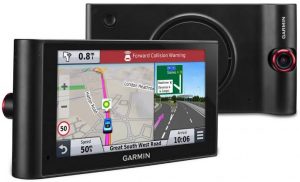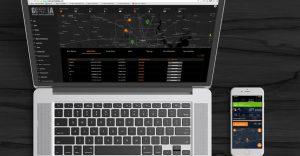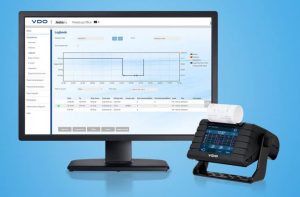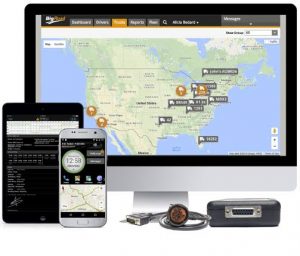Electronic Logging Devices or ELDs track a driver’s operating hours in real time. Drivers won’t be able to forget or move their paperwork, but it is automatically retrieved directly from their vehicle’s engine.
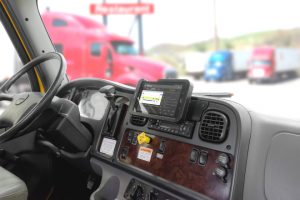
Since December 2017, the US government has required the installation of emission control devices in most commercial vehicles in the country. It’s hard to think of a better reason to make sure your fleet moves to ELD.
The ELD mandate was received with mixed feelings from drivers and fleet owners. Some of these feelings are frustration and confusion about the various ELD programs and plans. Simplicity is always our goal, but we find it more important to help you find the right options for your situation.
Now that you know what an ELD is, and you have to buy one that is “approved”, so which one do you choose? Read on for more information on how to select the best ELD devices.
ELD Reviews 2021 – The Top 10 Devices
| ELD Name | FMCSA Compliant | Upfront Cost | On-Going Fees |
|---|---|---|---|
| KeepTruckin ELD | Yes | $150 | $20 or $30 plans |
| Transflo ELD T7 | Yes | $99 | $25 |
| Omnitracs (IVG) Intelligent Vehicle Gateway Master Pack | Yes | 799 or more | $23 or more |
| Rand McNally – Electronic Logging Device ELD 50 | Yes | $149 | $15 or more |
| BigRoad DashLink ELD | Yes | $0 with Lease | $15.6 per user/truck |
| J.J. KELLER Encompass ELog Electronic Logging Device | Yes | $0 with BYOP option | $11 or less |
| Linxup ELD | Yes | $250 or $100 with contract | $30 to $50 |
| Gorilla Safety ELD | Yes | $0 | $10 |
| PeopleNet Display.4 | Yes | $0 with lease option | $30 to $60 |
| Blue Ink Technology | Yes | $295 | $0 |
1. KeepTruckin ELD: Best ELD for Owner Operators
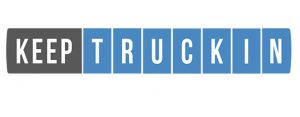
KeepTruckin ELD is the simplest and most reliable ELD solution currently available on the market.
Designed for professional drivers, it has proven to be the best ELD solution in its class and also meets all FMCSA requirements for the ELD mandate.
The KeepTruckin device connects directly to the vehicle’s diagnostic port (using the supplied 6-pin or 9-pin cables). The KeepTruckin Electronic Logbook App for Android and iPhone/iPad connects to the ELD via Bluetooth and automatically records the driver’s active hours.
With the KeepTruckin Logbook App drivers can create vehicle inspections, check their logs, send messages and much more. Download the application from the Google Play Store or Apple App Store.
2. Transflo ELD T7 – A Robust GPS Electronic Logging Device
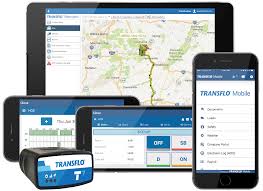
Transflo is one of the leading providers of ELD solutions in the transportation industry for the automation of business processes, telematics and mobile product solutions. The company offers many real-time communication systems for commercial vehicle drivers, fleets and brokers as well as a wide range of products.
Transflo’s software packages generally include telematics and electronic devices for recording, document management and more. Strategies include management services and a Product Support Center.
Features:
Telematics and monitoring of the GPS fleet
Transflo offers an FMCSA-certified telematics device to enable road transport companies to pursue new telematics and mobile strategies. The company has partnered with Geotab to offer Transflo Telematics, a recognized software for fleet management and GPS fleet tracking.
Operational mobility of a single application
Transflo Mobile enables fleet managers and drivers to redefine the efficiency of communication and operational safety. The application is easy to configure and supports full workflow support.
Drivers can use sophisticated protocols to capture and transmit images that compress size while maintaining quality. In short, Transflo continues to provide an easy way to improve driver productivity and business profitability.
3. Omnitracs (IVG) Intelligent Vehicle Gateway Master Pack
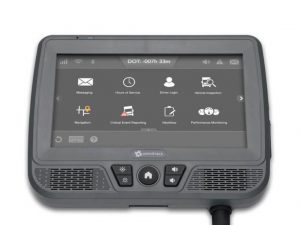
Omnitracs has been a well-known company in the trucking industry for years thanks to its advanced fleet management solutions. It was also one of the first users of ELD standards that enabled the company to master the technology ahead of the competition. Proof of this is their IVG, probably the most advanced ELD device currently available. Omnitrac’s Intelligent Vehicle Gateway (IVG) is a completely autonomous solution (no need for a phone or tablet) and also offers a practical feature, a hands-free kit. One of the most time-consuming aspects of the ELD rule is the entry of all necessary information via the virtual keyboard, which is why voice commands are so convenient. In addition to voice control, IVG offers a wide range of advanced features that can be expected from a company specializing in fleet management solutions. The Omnitracs IVG is an excellent device and is more expensive than most other ELD devices. But if you don’t think it needs a smartphone or tablet to work, the $800 purchase price is a little reasonable.
Features at a glance
Basic features: Electronic logging, vehicle inspections, messaging, ELD compliance, GPS tracking, alerts.
Extra features: IFTAfuel control reports, hands-free voice control, vehicle utilization, DOT inspection mode, engine diagnostics, fuel monitoring, geofencing and tampering alert system.
Compatibility: Almost all heavy-duty models.
PROS
- Standalone ELD unit with 1024×600 LCD touch screen.
- Hands-free voice commands, no need to type!
- Easy to install.
- High quality device.
- Reputable brand.
- Free iOS/Android application for remote operation.
- FMCSA certified.
CONS
- Relatively high start-up costs per vehicle.
4. Rand McNally – Electronic Logging Device ELD 50 – The Best Intuitive Electronic Logging Device
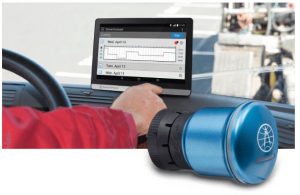
The Rand Mcnally ELD 50 is the preferred choice of professional drivers because of its reliability and ease of use. It is a compact E-Log recorder that can be installed in seconds and allows drivers to view and certify logs and more with their own smartphones, tablets and new Rand McNally truck navigation devices.
The ELD 50 is the first electronic logging device that allows drivers to use Android devices to view their logs.
It also provides access to Hours of Service and Driver Vehicle Inspection Reports (DVIR) via the Rand McNally DriverConnect website.
Finally, it can be installed under your vehicle’s dashboard in seconds.
The ELD 50 opens a world of new possibilities for professional drivers looking for ways to comply with the ELD mandate.
Main features:
- Pair with a tablet or phone
- View logs and more with the free DriverConnect application
- Check Engine Diagnosis
- Access to the history of HOS Log
- Installation in a few minutes
5. BigRoad DashLink ELD – The Best ELD for a Small Fleet
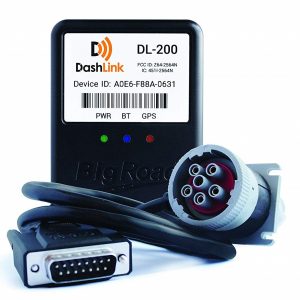
BigRoad’s FMCSA-certified DashLink ELD is an easy, affordable and flexible way to comply with ELD standards! Easily create logbooks connected to the engine and track your uptime by connecting DashLink to your vehicle’s diagnostic port. Via a Bluetooth connection, DashLink sends information to the free BigRoad Mobile application installed on your Android or iOS device (phone or tablet). With BigRoad – the first choice for ELD compliance – you can proactively manage your uptime by being notified of violations in real time, avoiding errors in form and behavior and better managing your operations.
The BigRoad DashLink mobile application is a very popular standalone application that allows drivers to keep logs on their mobile phones. The mobile application can be downloaded for free, but you must register and pay a monthly fee to access the data.
Just like the other BYOD options (buy your own device), this application works perfectly with Android and Apple Tablets or mobile phones. It makes it possible to record the driver’s service status such as availability, vehicle driving time and also makes it possible to avoid HOS violations.
The BigRoad ELD does not allow 3G connectivity, but sends information via Bluetooth. It is very popular with truckers.
You must also ensure that your phone is connected when you use the application. This is because Bluetooth works well when the phone is fully charged.
We also like BigRoad because there are not many purchase costs beyond the cost of the device. The installation takes less than fifteen minutes, so this solution is well suited for small businesses and operators.
6. J.J. KELLER Encompass eLog Electronic Logging Device – The Best ELD for Compliance
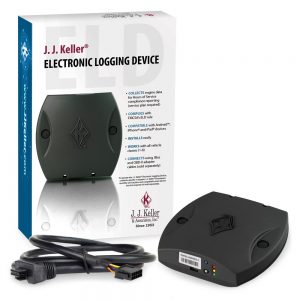
The J. J. Keller Encompass Fleet Management System with ELogs gives you a complete overview of your schedule and helps you avoid quotes, fines and service orders while maximizing the hours available to your driver.
It is the simplest, most flexible and cost-effective ELog solution in the industry.
J. J. Keller’s ELog solution has over 60 years of regulatory expertise and have the following features:
- The installation takes less than ten minutes, is compatible with all vehicle classes (1-8) and Bluetooth capable of communicating with intelligent devices.
- Capture J. J. Keller ELDs data via the J. J. Keller Mobile Logging App so that drivers can track service status and run EDVIRs. Device options include:
- Bring-Your-own device (BYOD) – Drivers download the J. J. Keller Mobile application to your iPad, iPhone or Android Smart Devices.
- J.J. Keller Compliance Tablet – An Android device with the J.J. Keller Mobile application installed, a data plan and the ability to add the
- CoPilot navigation system to Truck for better route planning. The tray is available in two versions:
- Semi-Rugged Compliance Tablet for heavy-duty use
- Professional Compliance Tablet for less rugged environments
- Include state and industry-specific sets of rules such as U.S. and Texas, Canadian, federal, exempt, short-distance, agricultural and many more.
- Provide optional performance management tracking to identify speeding, hard braking, downtime and off-road mileage.
- Integrate exceptional customer service, including 24/7 support, a roadside inspection hotline, online training videos, DataQs Challenge service, support resources and more.
- Comply with the ELD directive. Our devices can be used as ELDs or AOBRDs until 12.2019, when they will be compliant by a simple update.
7. Linxup ELD – The Best Dedicated ELD System
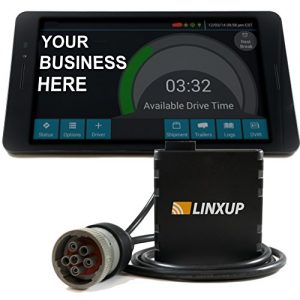
The Linxup GPS is perfect for any company, regardless of its size, that needs to improve its efficiency and safety, reduce its costs and operating costs, and provide better service.
A simple, powerful and cost-effective way to manage your valuable fleet and equipment. Increase efficiency with easy-to-use Google-based maps, meaningful reports, driver behaviour scorecards, maintenance monitoring and alerts for unauthorized or inappropriate use. Our devices are easy to install and use, and operate on a reliable 4G network. Linxup is also an FMCSA-approved ELD solution with options for cold chain and temperature management, IFTA and more. Accessible with free mobile applications for iPhone and Android.
Complying with federal mandates has never been easier with Linxup’s ELD solution. Quick to install, easy to use and very affordable, our FMCSA certified ELD solution offers you:
- Industry-leading electronic recording software and equipment
- Dedicated ELD data plan
- World-class technical support and customer service 24 hours a day, 7 days a week
- Special jBus ELD tracking device that is guaranteed to work with the software.
- Special tablet for the ELD software portal
- Online help and video tutorials
8. Gorilla Safety ELD – The Best ELD for Fleet Management
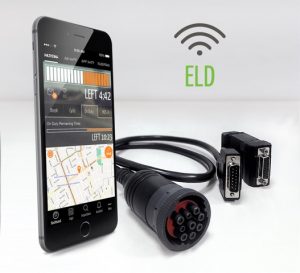
Gorilla Safety is the most flexible fleet tracking system available on the market today. By using the Bring-Your-Own-Device platform and its pairing with Gorilla Trax, each fleet has the possibility to use smartphones or tablets from existing drivers and operators to maximize the performance and efficiency of their fleets. Gorilla Trax is offered in addition to the Gorilla security suite and ELD (Electronic Logging Devices) compliant versions of its patented solution. Gorilla Safety remains at the forefront of its fleet equipment with the latest technologies to ensure continuous safety on our roads.
Gorilla Safety’s GPS technology works by attaching a proprietary Gorilla Trax device to the vehicle or object, which communicates with its mobile application when a driver is in the vicinity. This ensures that the vehicle or object is in a specific location and whether the driver is actually working, when and where it is displayed. While it is important to know where the employee is, it is more important to follow the vehicle or equipment.
The Gorilla Fleet Management product range has evolved to meet the needs of the modern transport fleet. Each module complies with the ELD directive and meets all the requirements of the FMCSA mandate. We want to offer options to those who only want an ELD-compliant solution for truck fleets that want to collect their IFTA mileage, maintenance/repair processes, accident information and manage company policies and procedures more effectively.
9. PeopleNet Display –The Best High-End ELD
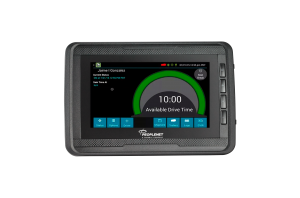
PeopleNet focuses exclusively on providing integrated, Internet-based on-board computers and mobile communications systems to improve fleet management for the North American trucking industry. Its products are used by nearly 2,000 full truckload, LTL, private and service fleets in the United States and Canada, including several Fortune 500 companies. Recognized for its customer-focused technological innovation, unparalleled flexibility and proactive customer service, PeopleNet was the first major technology provider to offer Internet communications to the transportation industry 20 years ago.
Unlike other ELD systems that only synchronize displays and engine data in the cloud, PeopleNet’s eDriver logs connect displays and data locally to ensure that pilots can always access their protocol information regardless of network connectivity. Through the eDriver Logs user interface, drivers can monitor their available hours and present their logs to road inspectors. Safety managers can also access the reporting platform to consult logs, suggest changes and obtain information on the hours of service (HOS) of their entire fleet.
PeopleNet’s eDriver logs are self-certified to meet the requirements of the Federal Motor Carrier Safety Administration’s (FMCSA) Electronic Logging Device (ELD).
By using eDriver Logs on the PeopleNet Android platform, fleets have access to 4G LTE connectivity and the ability to choose from a wide range of Android devices, including various commercial and consumer tablet options, a wireless display.
10. Blue Ink Technology – The Most Affordable Electronic Logging Device
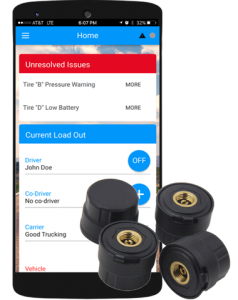
Blue Ink is a revolutionary electronic logging device for fleet managers, drivers and transportation companies in the United States. The product aims to improve performance and promote better location for drivers and fleets.
The BIT ELD offers simple execution of mandates with a great advantage; no contract and no monthly fees. It includes all the essential features you need for the FMCSA’s ELD mandate. With years of experience in the transportation industry, they have perfected electronic recording technology.
The product is considered to be one of the cheapest ELDs on the market. Although the hardware of BIT ELD devices is associated with costs, the application and web dashboard cost nothing more.
It is easily accessible online and its use is completely free of charge. Reviews from drivers and fleet managers indicate that the web portal is easy to use and helps them print newspapers, check FAQs and much more. Drivers across the country rated the device’s efficiency and ease of use. This is mainly due to its unique features and easy-to-use user interface.
The main characteristics are as follows:
- BIT ELD application
- com (Web dashboard)
- IFTA Fuel Tax Reporting
- Maintenance Schedules
- Fleet Visibility
What You Need to Know Before Buying an ELD Device
Since the Federal Motor Carrier Safety Administration (FMCSA) published its final rule on electronic recording devices in late 2015, a large part of the trucking industry has focused on ELDs. On December 18, 2017, the ELD’s national mandate came into effect – a decision that was opposed by many independent owner-operators and small carriers who still use paper balls.
An ELD or electronic recording device is a small device used to track a vehicle’s travel time. Once an ELD is installed in your vehicle, the device synchronizes with the vehicle engine to automatically record when the engine is running.
The ELD is designed to make it easier and more accurate for carriers and truck drivers to record their operating times. The automation of an ELD replaces the time-consuming process of keeping a paper journal while ensuring that the driver complies with legal requirements regarding federal hours-of-service rules.
Choosing the right electronic recorder (ELD) is essential. If you make the right decision, you can simplify compliance, increase safety and efficiency. However, if you make the wrong decision, you may face unreliable technology, additional or unexpected costs and have the opportunity to repeat the process.
This guide describes the main factors to be considered. By going beyond price and looking at the additional features and security, you can find the right solution for your needs and a solution that lasts.
1. COST
In preparation for the adoption of the ELD mandate, the FMCSA examined a number of similar HOS recording devices on the market and established a benchmark for what fleets can pay annually.
What did they find?
The range of electronic recording devices ranged from an annualized price of $165 to $832, with the most commonly used device today costing $495 per truck.
The FMCSA notes that although prices for electroluminescent wheeled vehicles have not dropped dramatically in recent years, many suppliers are introducing more cost-effective fleet management system models with features designed specifically for the ELD mandate.
Based on this trend and taking into account the economic benefits of reducing paperwork, FMCSA has found that the long-term savings from ELDs outweigh the costs to drivers.
In addition, the introduction of ELD devices operating on smartphones or tablets, as opposed to fixed equipment, further reduces start-up costs. Regardless of the size of the company – from the independent owner/operator to the large national carrier – the return on investment is achieved almost immediately. This type of ELD solution also has the additional advantage of allowing the device to be detached from the passenger compartment, allowing truck drivers to benefit from powerful data analysis and other mobile applications anytime, anywhere.
The FMCSA estimates that the total annual cost of implementing the directive will be $975 million, including all equipment for freight forwarders and commercial truck inspectors, as well as training for inspectors and drivers.
2. INSTALLATION AND OPERATION
Easy to install
The speed of installation can affect the overall deployment of the ELD. A complicated installation can be long and costly for your budget. Ask us how fast the installation will be and how much it will cost. A plug-and-play solution simplifies the process and even allows commissioning in minutes, not days or hours.
Simple to Operate
An intuitive ELD application is essential. Drivers have many other tasks to perform when they are on the move. They need a solution that allows them to easily update their status, perform complete vehicle inspections and quickly submit a compliance report during roadside inspections. Administrators need reliable data collection and reporting to easily monitor compliance and hours of service (HOS) violations. A confusing user interface or a complicated workflow site can compromise your compliance program.
3. COMPLIANCE
When you choose a device certified by the manufacturer itself and listed on the FMCSA website, you are working with a company that has ensured that it meets the ELD technical specifications established by the FMCSA. If you choose a device that is not on the list, you may have a device that does not meet the standards, which means you may have to purchase another device in the future.
Many ELD service providers are taking a proactive approach by hiring a third party to certify their equipment. However, you will not know this when you consult the FMCSA list, so don’t forget to ask if they have been certified by the third party when you talk to them.
In the event of a dispute between a carrier company and a device, the FMCSA intervenes and investigates the devices. In these cases, if it is demonstrated that suppliers do not meet the technical specifications of the ELD, they will be added to the list of revoked ELD.
4. HARDWARE ACCESSIBILITY
A number of low-cost ELD providers offer systems that only require a smartphone or digital tablet that the user already owns. The system wirelessly exchanges the data from the mobile device with another special device that obtains the data from the electronic engine control module.
Although such systems are more affordable, the buyer should consider all options before purchasing such a system. A mobile phone or tablet may not have the same resistance as a specially designed ELD device. A system may require a paid subscription service in addition to the device’s regular data plan.
Buyers should consider how often batteries and chargers should be replaced; what about compliance if the battery is exhausted or if the driver forgets the mobile device at a gas station; what measures would be needed to prevent the device from being used while driving?
5. DATA ACCESS
One thing has not changed since the days of paper protocols: Automotive freight forwarders must be able to provide six months of ELD records with documents to verify their accuracy during an audit. These documents may include the following elements:
– Bills of lading or invoices that show the start and ending location for each trip
– Dispatch records or trip reports
– Expense receipts (meals, accommodation, gas, etc.)
– Records from electronic communication and dispatch systems
– Payroll accounting or settlement sheets
A valid attendance document for hours-of-service must include the driver’s name and three items that the GPS automatically detects: Date, time and location.
In many cases, the same customs status documents and records can be used to claim an expense deduction for an income tax return or distance calculations for fuel tax reporting (under the International Fuel Tax Convention) and prorated vehicle registration (International Registration Plan).
It should be noted that many electronic protocol providers automatically delete ELD entries after six months.
The Internal Revenue Service suggests that you keep the documents supporting an income statement for seven years.
During the review of the International Fuel Tax Agreement (IFTA) and the International Registration Plan (IRP), auditors may request GPS data that is four years old for IFTA and five and a half years old for IRP. In particular, an auditor may request to consult the raw GPS data to verify the distance calculated in his IFTA or IRP report. If missing GPS points create gaps in distance records, you should be prepared to provide the necessary documents – travel logs, travel sheets, disposition records, receipts – to fill these gaps and support your request.
When looking at non-prescription drug providers, don’t just evaluate one device. Ask your supplier for access to all the logbooks and GPS data you need when requested by an auditor.
CONCLUSION
The new ELD rule is a requirement of the Federal Motor Carrier Safety Administration (FMCSA) of the United States Department of Transportation for all drivers with a commercial driver’s license who are required to create HOS records of duty status (RODS).
The ELD rule will be applied with the aim of improving road safety through the use of advanced technologies and replacing traditional written protocols for commercial vehicles that are virtually impossible to verify. Road safety inspectors will now be able to more easily review driver records and more effectively detect violations of federal laws.
Fleet owners and owner-operators have several options with ELD solutions that make the new regulations easy to manage. Fleets using integrated ELD solutions can monitor and maintain electronic records to ensure compliance with HOS standards and allow managers and drivers to demonstrate this during Department of Transportation inspections. ELD software can also help fleets and drivers reduce HOS violations and improve compliance, safety and liability (CSA).
Although it costs money and labour to install an ELD in all commercial vehicles, there are many advantages to using an ELD.

